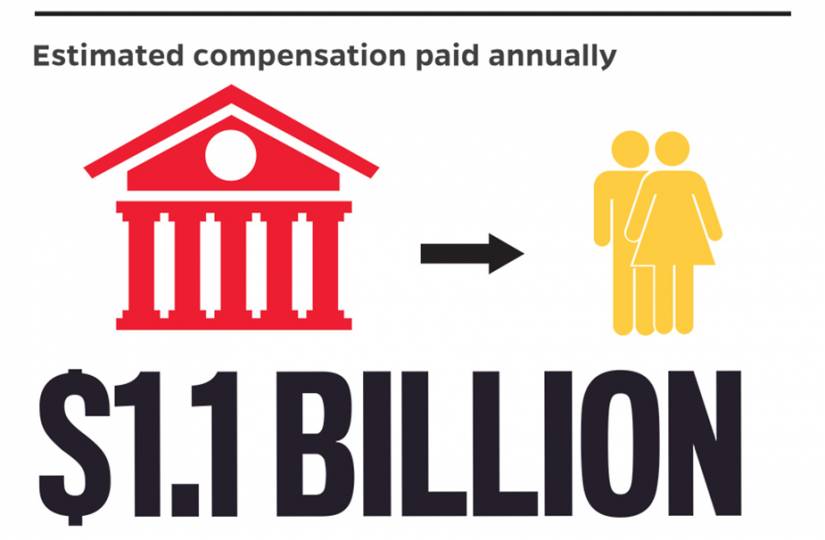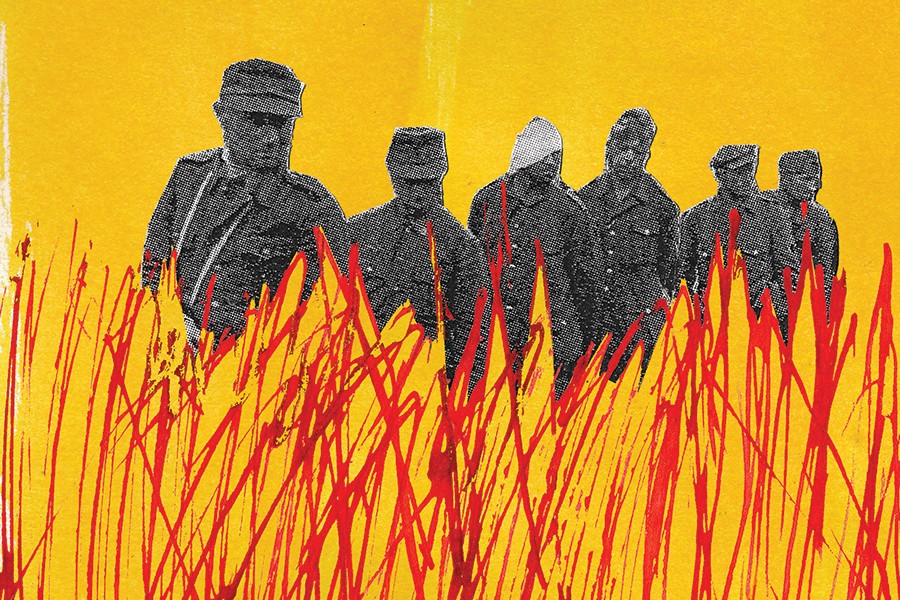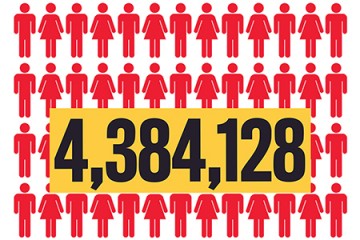In early March, German Chancellor Angela Merkel visited Japan, her first trip to the country in seven years. She met with Prime Minister Shinzo Abe to discuss climate change, terrorism, and free trade ahead of this summer's G-7 economic summit. She mostly followed the anticipated script, including innocuous photo ops at stopovers like the National Museum of Emerging Science and Innovation. But to the surprise of some and probable irritation of her host, no less than four times during the two-day visit, Merkel brought up how her country rehabilitated its international reputation after World War II by reconciling with Nazi victims and acknowledging the atrocities Germany had committed. At an event in Tokyo organized by the left-leaning newspaper Asahi Shimbun, Merkel referred to a 1985 speech by then West German president Richard von Weizsäcker, who called Germany's wartime defeat a "day of liberation." She added, "We Germans will never forget the hand of reconciliation that was extended to us after all the suffering that our country had brought to Europe and the world."

Image caption: Lily Gardner Feldman has been studying German reconciliation for four decades.
Image credit: Tony Richards
Her repeated references to German reconciliation, many contend, were not-so-veiled jabs at Japan's unwillingness to acknowledge the horrors it had committed during the war. Merkel even pointedly addressed the taboo subject of Japan's "comfort women," young girls of Korean, Chinese, Filipino, and Dutch descent forced into sex slavery by the Imperial Japanese Army during the war. The timing and content of her remarks were notable, as Prime Minister Abe plans to give an address on August 15 to mark the 70th anniversary of the end of World War II in the Pacific, amid rising speculation that he may water down Japan's past apologies for its aggression in Asia.
In the midst of faltering European economies, Germany has thrived. It has grown to become the fourth-largest economy in the world. Yet at the end of World War II, a mere 70 years ago, the country lay in ruins. Much of its infrastructure, including major ports and railroad hubs, had been heavily bombed by Allied air forces; the city of Dresden had been utterly destroyed. More than 7 million Germans lost their lives during the war; the population of Cologne dropped from 750,000 to 32,000. And morally, the country was beyond bankrupt as the gruesome details of the Nazis' systematic murder of 11 million Jews, Poles, Russians, Roma, homosexuals, and others were exposed. Yet Germany pulled itself out of this deep chasm to become one of the most influential and trusted nations. Many view the country as the lynchpin of the European Union. In a 2014 BBC World Service poll, Germany ranked first in popularity, with 60 percent of the international community rating it positively. How had the shadow of Hitler been overcome?
Lily Gardner Feldman has a lot to say about that. She is the author of Germany's Foreign Policy of Reconciliation: From Enmity to Amity (Rowman & Littlefield, 2012) and a fellow at the American Institute for Contemporary German Studies, a Johns Hopkins–affiliated think tank based in Washington, D.C., housed at the Brookings Institution. She is also director of the institute's Society, Culture and Politics Program. Since its creation in 1983, AICGS has focused on the unfolding German political and cultural narrative and how that impacts Europe and the rest of the world. The British-born Gardner Feldman grew up in London but spent several formative years living and working in Germany. After earning her master's in European studies from the University of Reading, a research university in Berkshire, England, she focused on Germany at the Royal Institute of International Affairs' Chatham House, an independent policy institute. She moved to the United States to pursue a doctorate in political science at MIT, where she wrote her dissertation on German-Israeli relations. "At the time, nothing had been written on this topic," she says. "There were two books that were highly anecdotal, but no scholarly work on the German-Israeli relationship. I happened to be at the right place at the right time."
German reconciliation would become the focus of Gardner Feldman's work for both professional and personal reasons. She says she was drawn to its culture at an early age. She studied the language under a grammar school teacher who had been a refugee from the Nazis. Her father had fought in the 8th Army during the war in North Africa and Italy, but according to Gardner Feldman he held no animosity toward Germany. At 17, she entered an exchange program and lived in West Germany while a German student lived in her home. "My father had no problem with this, and this was in the 1960s," she says. "That was atypical because politically and in popular culture there was still very much this wariness about Germany in parts of Europe. In fact, Margaret Thatcher was very reluctant about German unification in 1989."
For Germany, the road to prosperity began with trust, Gardner Feldman says. Germany realized that if it were to rejoin the international community, it could not run from its crimes but had to confront them. But reconciliation and atonement were not immediately embraced, says Hanns Maull, one of Germany's leading academic foreign policy analysts and an adjunct professor of strategic studies at SAIS Europe. At the end of the war, a form of "collective trauma" initially fell upon the German citizenry, Maull says. "There was a sense of catastrophe—physical and material. Germany was destroyed. Partitioned. And then there was this moral catastrophe. German society had to face and recognize what had just happened. But this rather quickly subsided and people had to deal with their daily lives. So this trauma and feeling of guilt was suppressed." What people see today as Germany's success in coping with its past really started in the late 1950s and took hold in the 1960s, he says. The catalytic event was the Frankfurt Auschwitz trials that took place from 1963 to 1965. These were the first major Nazi war crime cases pursued not by the victorious Allies but by the Germans. People who had served at the concentration camp were brought to justice. But even then, many Germans cast blame on the destroyed Third Reich, as if that were somehow separate from Germany.After Germany's defeat, the four principal allies—the United States, Great Britain, the Soviet Union, and France—occupied the German state. During this time, the U.S. Office of Military Government in Germany, under the leadership of General Lucius D. Clay, commissioned surveys of Germans about the recent past. The surveys found competing attitudes that cut through society. Nearly a third of those questioned persisted in anti- democratic and anti-Semitic sentiments; two-thirds denied even partial responsibility for the rise of anti-Semitism. Yet a substantial majority admitted that the German population as a whole should bear some blame or guilt for Nazi crimes. "Germany was then deeply divided on the interpretation of that responsibility," Feldman says. While the surveys found a view of guilt, there was a persistent negative perception of Jews, Gardner Feldman says; strikingly, one-third of those surveyed clung to the belief of the inferiority of Jews and the justice of discrimination, and 83 percent believed that Germany's crimes were only on the same level as other nations'.
Gardner Feldman describes this period as the "big silence." A population surrounded by rubble and occupation troops coped by burying the past. Some, however, accepted blame. Segments of German society involved themselves in organizations committed to penitence, notably various faith-based groups that reached out to France and the newly established Israel. This grassroots reconciliation effort was embraced and championed by Konrad Adenauer, the leader of the Christian Democratic Union party and the first postwar chancellor of West Germany. Adenauer was a deeply religious man who reportedly read the Bible each night. The personal importance of his faith was part of why he was influenced by faith-based groups, according to Thomas Berger, professor of international relations at Boston University and author of War, Guilt, and World Politics After World War II (Cambridge University Press, 2012). (Berger taught for seven years in the Krieger School of Arts and Sciences' Department of Political Science.)
Adenauer realized that to become a productive and prosperous nation, West Germany must forge close relations with old enemies. (East Germany, dominated by the Soviet Union, showed little inclination toward reconciliation. Says Maull, "East Germany saw itself as representing a different Germany and therefore refused to assume any responsibility for what had happened during the Nazi regime. West Germany, on the other hand, accepted—legally and politically—that it was the successor state to previous Germanys.") In 1951, at the behest of his Israeli counterparts, Adenauer began negotiations with Israeli Prime Minister David Ben-Gurion and Israeli Foreign Minister Moshe Sharett for a reparations agreement. In addressing his country's parliament to petition for the financial arrangement, Adenauer said Germany had a debt to pay: "Unspeakable crimes have been committed in the name of the German people, calling for moral and material indemnity." His government was prepared to offer a "solution of the material indemnity problem, thus easing the way to the spiritual settlement of infinite suffering."
Gardner Feldman says that Adenauer faced some resistance and skepticism. "There was not wholesale approval of his policies, indicated by the fact that he had to rely on the Social Democratic Party opposition to get ratification of any reparations agreement, and his own finance minister was opposed to it," she says. "There was concern about Germany's ability to pay, and how [an agreement with Israel] might damage relations with the Arab world." But Adenauer pressed on, driven morally by guilt and the need for reconciliation, and pragmatic calculations about what West Germany had to do to become respected again. Berger adds that West Germany was also responding to pressure from NATO and a potent Jewish lobby in the United States.

From the beginning of this "special relationship" between West Germany and Israel, there existed a gargantuan awkwardness. Israel did not authorize its passports for use in Germany. Many Jews to this day refuse to step on German soil or have any business with Germans. Menachem Begin, later Israel's prime minister, led opposition to the reparation negotiations. In Tel Aviv there were huge demonstrations that showed a deeply divided Israel. Both sides dug in and wielded moral arguments, Gardner Feldman says. "Ben-Gurion said it would be immoral to have let the Germans kill, maim, and dispose of us and not try to get something from them. Begin argued it was immoral to deal with these awful people."
Israel was in a difficult position. The fledgling state was an economic disaster. The director of the finance ministry, David Horowitz, was scouring the world for funds. He concluded that the only place Israel could get financial help was from West Germany, and that was when Israel began to make claims for compensation through reparations. To devise a formula, they did not base reparations on what had been lost because such a toll, they felt, could never be calculated. Instead they formulated the cost of resettling Holocaust survivors in Israel. On September 10, 1952, a reparations agreement between Israel and West Germany was signed in Luxembourg. The talks had been conducted in English and there were no handshakes or smiling faces at the signing of the pact, under which West Germany was to pay Israel for integrating Holocaust survivors and agreed to devise German domestic legislation to pay compensation and restitution to individual Jews. The first reparations payments to the Israeli state as goods in kind began in 1953 and ended in 1965; payments to individuals continue to this day. By the end of 2008, Germany had provided 66 billion euros in all forms of compensation, with the largest share going to Israel. Some Israelis said it was akin to taking blood money, but the agreement brought in German goods and infrastructure that built and stabilized the Israeli economy.
Gardner Feldman, who has been researching German reconciliation for more than 40 years, says nearly every conceivable dimension of political and social relations was engaged in this bilateral connection between West Germany and Israel. At the same time, Germany was developing a similar relationship with France through cultural institutions such as the Franco-German Youth Office. In January 1963, French President Charles de Gaulle and Chancellor Adenauer signed the Élysée Treaty that established a new foundation for relations and ended centuries of rivalry.
In the 1960s, West Germany under Willy Brandt, who first was foreign minister and then chancellor, reached out to the East and made steps toward reconciliation with Poland in particular. Brandt said Germany had to build with Poland what it had built with France. On a cold wet day in Warsaw on December 7, 1970, Brandt laid a wreath at the memorial of the Jewish ghetto. The lasting image of that day was a photo taken when Brandt fell to his knees in front of the memorial and remained completely still for half a minute on the wet stone floor. That same day, Brandt signed the Treaty of Warsaw, which committed Germany and Poland to nonviolence and accepted the existing border—the Oder-Neisse line, imposed on Germany by the Allies at the 1945 Potsdam Conference. Here was a man who had resisted Hitler and owned no direct responsibility for Nazi atrocities, but took on the full weight of their actions. Though West Germany had gone to great lengths to express contrition for the transgressions of the Nazis, German political leaders long avoided the concept of collective guilt and underlined that Germans had to atone for crimes committed by the Third Reich, not the nation. Brandt, however, was the first German head of government to adopt a clear stance that "no German is free of history."
Germany's ongoing relationship with Israel is unique, Gardner Feldman says, but one can see similar reconciliatory themes, approaches, and patterns through Germany's relations with its other former enemies. In her book, she argues that the "cornerstone, perhaps the very definition, of German foreign policy after World War II became, progressively, reconciliation." Germany had to reconcile with the countries and people it had attacked, occupied, and slaughtered during a brutal six years of war and destruction. Gardner Feldman examined all German chancellors from Adenauer to Merkel and found a common strain: an imperative to repay a deep moral debt.
Germany has never singled out England and the Netherlands the way it did France, Israel, Poland, and Czechoslovakia. Gardner Feldman speculates, "Maybe [Germany] looked at the most egregious examples or countries that could bring it the most benefit?"
Germany's Axis partner Japan has done little in terms of reconciliation. The Japanese government insists its own reparations issue was settled by the 1965 Treaty on Basic Relations between Japan and the Republic of Korea, and the Joint Communiqué of the Government of Japan and the Government of the People's Republic of China in 1972. Japan has rejected claims from individual Korean and Chinese victims. Examples of apologies include the 1993 Kono Statement, by Japanese chief cabinet secretary Yohei Kono, that acknowledged the Japanese Imperial Army had forced women to work in military brothels during World War II. This statement led to the creation, a year later, of the Asian Women's Fund, which provided aid and support to women who were forced into prostitution. It was dissolved in March 2007. Gardner Feldman also mentions two statements by Japanese prime ministers: one in 1995 by Tomiichi Murayama on the "need to learn from history"; the other in 2005 from Junichiro Koizumi on the 60th anniversary of the end of the war, "that Japan must never again take the path to war, reflecting that the peace and prosperity we enjoy today are founded on the ultimate sacrifices of those who lost their lives for the war against their will," and that Japan, through its colonial rule and aggression, "had caused tremendous damage and suffering to the people of many countries, particularly to those of Asian nations."
In an April 2014 edition of Foreign Policy magazine, Gardner Feldman wrote in an article titled "Reconciliation Means Having to Say You're Sorry" that these apologies, while a good start, "stand as islands in a sea of denial, not as markers in a consistent effort to face the past. None was followed by robust, concrete action." And in 2013, Prime Minister Abe questioned whether the term "aggression" should even be used to describe Japan's wartime behavior.
Some right-wing politicians have called for Tokyo to revise or rescind the Kono and Murayama apologies. Gardner Feldman observes, "Whereas the Germans from 1949 until today are still saying, 'Sorry' and, 'This is our burden from the past,' you have a Japan whose actions contradict the apologies they have uttered." She cites a 2014 visit by Japanese government officials to Tokyo's Yasukuni Shrine, a memorial to Japanese war dead that critics say honors war criminals and the country's past militarism. The shrine is particularly anathema to China, which was occupied by Japan before and during World War II, and Korea, which was colonized by Japan from 1910 to 1945. Various government ministers paid their respects at the shrine, and Prime Minister Abe sent a small masakaki tree. "These kinds of acts [make the] South Koreans and the Chinese go crazy because it glorifies what these people did," she says. Germany, meanwhile, has used sites of Nazi crimes, such as concentration camps, as learning and teaching tools and visible representations of atrocities. In Berlin, there are countless physical reminders such as words engraved in cobblestones that mark the arrests of Jews or where families lived before they were pushed out by the Third Reich.
While Japan has largely forgone reconciliation, Germany has used its policy to claim a moral high ground and become a trusted power. Hanns Maull, the foreign policy analyst, says that one reason Germany has become so trusted is the lengths it has gone to distance itself from its days as an aggressive power. "Whereas you might say power is central to politics, power is taboo to Germany today," Maull says. "People don't like to talk about it because the abuse of power was so dramatic and has deep implications for the collective conscience. Military power, in particular, is taboo. Germany debates the role of force and has a very cautious approach. Germans are willing, under certain conditions, to use military force but never to use it alone and only when there's no choice but military intervention." That trust from its neighbors, Maull says, made German reunification possible. "And Germany's relationship with Israel has been a cornerstone of that trust."
Is there a foreseeable end to reconciliation? Gardner Feldman says no. "It's an ongoing process and it never ends," she says. "That's why today you have young Germans with absolutely no relationship to what happened in World War II willing to volunteer in countries seen as victims of the Nazis." Maull agrees. "Every year, what reconciliation means might change, but it's open-ended. Every new generation has to deal with this." Gardner Feldman notes that there are still commissions monitoring the language used in German textbooks, unfinished compensation issues, and attempts to reclaim art seized by the Nazis.Gardner Feldman says other nations might learn from this. She argues that Germany could help China and South Korea settle decades-long disputes with Japan over the ownership of islands in the East China Sea and Sea of Japan, as well as show the way for Japan to make amends. Germany can point to lessons it has learned. For example, reconciliation doesn't need to lead to perfect peace and harmony, as Germany and Israel certainly don't see eye to eye on everything. And reparations can be paid long after the underlying crimes were committed—it's never too late.
The key is that reconciliation requires goodwill on both sides. In the case of Japan, its refusal to acknowledge wrongdoing stunts its dialogue with China and South Korea. "The Japanese standard response is, 'We are not like Germany,'" Gardner Feldman says. "They say, 'We didn't do the things Germany did.' But when they've said that to me at the foreign ministry, I say, OK, set aside the Holocaust—you were still an aggressive and occupying power, like Germany. But they say the comparison is not useful."
Foreign policy experts point out that the onus is not all on Japan. Its victims need to be magnanimous and open to reconciliation, as well. "The point Merkel tried to make in Japan, I feel, is that the Germans are very grateful that the hands of reconciliation were extended to them," Gardner Feldman says. "The victims took the initiative. She basically said, 'I'm not here to give tips to the Japanese and others. But I can talk about what Germany did.'"
Greg Rienzi, A&S '02 (MA), is the magazine's contributing writer.
Posted in Politics+Society
Tagged history, germany, world war ii









